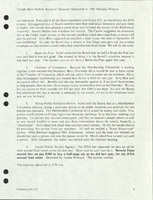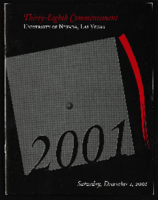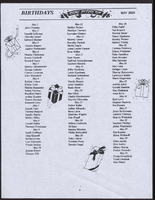Search the Special Collections and Archives Portal
Search Results

Transcript of interview with Lt. Harry Fagel by Barbara Tabach, April 15, 2016 and January 13, 2017
Date
Archival Collection
Description
In the signature line of Harry Fagel?s emails is a reads: Be the light in dark spaces. This illumines the person that Harry is both as a police officer and a poet in Las Vegas. Harry is native Las Vegan, who has served the community with the Las Vegas Metropolitan Police Department for nearly 30 years. He currently is a police lieutenant serving in Laughlin, Nevada. In addition, Fagel is a respected poet, writing both for the public and on commission. He performs in the local poetry scene. He also has showcased his poetry in two published books, released an album, and is a recipient of the Hilliard Endowment Grant from the University Nevada, Reno. Fagel is a graduate of the University of Nevada, Las Vegas, and currently lives in Henderson with his wife, Leilani and two sons, Sam and Jake. In this interview, Fagel discusses his family background, how his grandparents came to live in Las Vegas in the 1950s, as well as his relationships with both his mother and father. He recalls his early jobs which included working for his cousin Freddie Glusman?s restaurant Piero?s and for Circus Circus-long before becoming a policeman. His involvement with the Jewish community started young and he shares how it has evolved over the decades. In addition, Fagel reflects upon his career as a law enforcement officer, the progressiveness of the Las Vegas Metropolitan Police Department, and changes in relations between the police and communities, both locally and nationally. Lastly, Fagel talks in detail about his poetry, its dominant themes, and the local poetry scene.
Text

Transcript of interview with Celia Rivero Grenfell by Patricia Hollard, March 31, 1977
Date
Archival Collection
Description
On March 31, 1977, Patricia Holland interviewed Celia Rivero Grenfell (born 1926 in Las Vegas, Nevada) about her life in Southern Nevada. Grenfell first talks about her family background in Mexico and later describes her family’s restaurant business. She also describes her education, recreational activities, Downtown Las Vegas, and Helldorado. The two also discuss racial segregation and prejudice, the El Rancho Vegas, Lorenzi Park, early churches, environmental changes, early air conditioning, and Grenfell’s early work in a laundry business.
Text

Transcript of interview with Bud Weil by Claytee White, December 9, 2003
Date
Archival Collection
Description
Bud Weil worked as a disc jockey in Mexico after serving in the military during World War II. In 1947, he moved to Las Vegas to work at KLAS but after two days he was job hunting. His search landed him at KENO, a radio station owned by Max and Laura Belle Kelch. His was an interview show that afforded him entree to stars performing in town. The list of his favorite interviews includes Sophie Tucker, Sammy Davis, Jack Benny, The Mills Brother, Rosemary Clooney, Leno Home, Joey Lewis and many others. In 1955, he became restless, left the career in broadcasting, and joined Max Kelch as a partner in a new venture for Las Vegas - Musak. This enterprise took him to the doors of every business in town and shortly, he knew everybody. He uses that knowledge in this interview to talk about all aspects of life as the town grew over the years. Today he is a senior statesman of our town, enjoying everything about Las Vegas except the traffic.
Text

Interview with Jeannette (Jean) M. (Mactaggart) Crooks, July 21, 2004
Date
Archival Collection
Description
Text

Minutes from Temple Beth Sholom Board of Directors meetings, September 1992 - December 1992
Date
Archival Collection
Description
Meeting minutes include reports from committees of the board, correspondence, and balance sheets.
Text

Robin Greenspun oral history interview: transcript
Date
Archival Collection
Description
Oral history interview with Robin Greenspun conducted by Barbara Tabach on February 09, 2017 for the Southern Nevada Jewish Heritage Project. In this interview, Greenspun discusses her family background and growing up in Las Vegas, Nevada. She talks about her early interest in the arts, working in television productions, and becoming a film director.
Text

Cherina Kleven oral history interview: transcript
Date
Archival Collection
Description
Oral history interview with Cherina Kleven conducted by Cecilia Winchell on June 9, 2021 for Reflections: The Las Vegas Asian American and Pacific Islander Oral History Project. Cherina Kleven talks about her family and childhood growing up in Taiwan amongst six siblings. She shares her family's history and how they immigrated to Las Vegas while she was a teen, as well as her employment history and how she met her husband. Cherina talks about racial and gender discrimination and the obstacles she has overcome to be the only working female in her family, the only woman firefighter at her station house, and the first female Asian American Assistant Fire Chief in the United States.
Text

University of Nevada, Las Vegas (UNLV) 38th commencement program
Date
Archival Collection
Description
Commencement program from University of Nevada, Las Vegas Commencement Programs and Graduation Lists (UA-00115).
Text

Stephen Round oral history interview: transcript
Date
Archival Collection
Description
Oral history interview with Stephen Round conducted by Claytee D. White on October 25, 2017 for the Remembering 1 October Oral History Project. In this interview, Stephen A. Round, a career military contractor, describes his experiences during the 2017 mass shooting in Las Vegas, Nevada. Round mentions moving to Las Vegas in 2013 and in later years staying at the Aria on the evening of October 1. He describes the chaos of the shooting and the 12-hour-plus lockdown at the Aria hotel and casino. The day after the shooting, Round built a memorial around the shooting site and protected it. Once the memorabilia of that first site was taken to the Clark County Museum, he moved to protect the second memorial at the "Welcome to Las Vegas" sign where crosses devoted to the victims had been placed. Along with his preservation of the memorials, Round describes his preparation of a book that was signed by many who visited the sites. Round explains that he was able to see some of the best and worst of humanity during those days of watching and caring for the memorial sites as well as helping any victims, families of the victims, and sympathizers of the Las Vegas 2017 shooting.
Text

